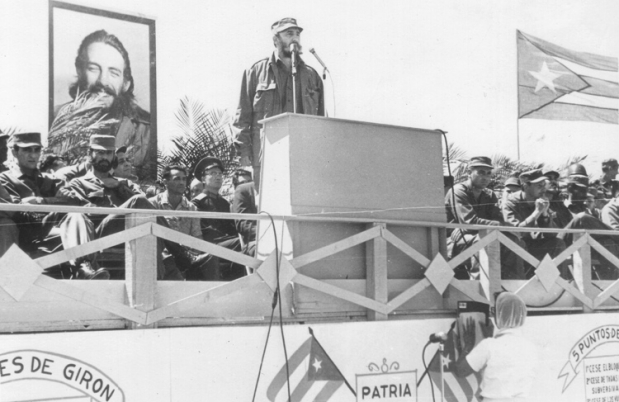
Let’s say that for a long time the damn phrase hasn’t been heard in the mainstream media (although I must admit I’m not exactly a follower of that media). In any event, it’s been missing from the speeches, which slyly avoided it, like those who choose to ignore as far as possible the hard expressions of the Stalinist period before 1989. However, a few days ago, during a news broadcast, a young and elegant announcer mentioned it and it fell on my ears with the force of a blow: “The activity demonstrated the ‘revolutionary intransigence’ that characterizes our people.”
Revolutionary intransigence, the girl said, and her face, far from being grim and fierce, glowed with the happy enthusiasm of someone alluding to an invaluable treasure.
The negative charge of this buzzword is overwhelming, along with some of its synonyms — intolerance, fanaticism, obstinacy, stubbornness, persistence — but I understand that no word is bad in and of itself. In fact, almost all of us refuse to compromise on some essential issues or principles, without doing harm to others and without clinging to a deliberate, insurmountable rigidity of spirit. However, context marks the differences. Personally, it makes me sick to recall the whole nightmare brought on by the practice of revolutionary intransigence as a vehicle of terror and social control in times that, perhaps naively, we prefer to assume are in the past.
Let us briefly review some forms of expression of this official strategy called intransigence, which marked the lives of everyone in the Castros’ Cuba and by virtue of which every Cuban was supposed to betray their comrades at the slightest suspicion of not sufficiently appreciating the process and its leaders or not showing the zeal and enthusiasm (also revolutionary) appropriate in every circumstance:
“Obstruct” even the slightest critical manifestations — and if they were veiled or moderate, these tended to be the most “dangerous” — if they were directed against the government, official regulations, a mere member of the Cuban Communist Party (PCC), etc. Combat “softness,” the “tendency to individualism” and certain “aberrations” such as homosexuality, or deeply rooted and damaging scourges such as religious beliefs of any denomination; clearly demonstrate a rejection of “petty bourgeois deviations” such as a taste for things, fashion, music, etc., and for capitalist countries, particularly the United States (sins classified as “ideological diversion” and of which wearing jeans, listening to rock music, and having long hair were considered among the most serious); and many more. Not to mention recognizing any kind of political opinion that different from the line carefully monitored by Moscow.
Past and present damage
Due to the application of the intransigence as a strategy in the service of power, there have been crimes on the Island such as the firing squads, the the Military Units to Aid Production* (UMAP), schools in the countryside**, discrimination and harassment of individuals and groups on grounds of religious belief or sexual preferences, the repudiation rallies*** in all their different gradations — which continue even today — annulment of independent civil society and a free press, and many other diabolical variations designed to enclose in the iron fist of totalitarianism even the slightest hint of public will.
Intransigence has been the mother of censorship in literature, film and other forms of art and culture, and also has gagged creation and initiative in all spheres of national life. It is not by chance that Ernesto Guevara is considered the paradigm of intransigence and what should have been the “New Man.”
We could talk about other disastrous events that left us a legacy of intransigence throughout our history, including examples from all stages prior to 1959, but I’m afraid that the count would be too extensive. If I prefer to refer to the so-called “revolutionary” stage it is because it was after that deceptively bright January when to be intransigent was generalized and established itself as a policy and became a feature of decorum and social recognition. Many accepted it, many others remained silent and everyone, absolutely everyone, was afraid. And so it was able to do so much damage.
Thus, I was perplexed when a smiling barely thirty-something speaker pronounced the word malignant, and shuddered at the regenerative power of the perversity of the system that is trying to perpetuate itself like a crust on the psyche of certain individuals of new generations.
Does this girl know how much pain revolutionary intransigence has produced in this nation? Since then and going forward, fighting revolutionary intransigence has become a permanent item on my personal agenda.
Forgive me readers if this decision makes me look somewhat intransigent.
Translator’s notes:
Military Units to Aid Production was a system of concentration camps for undesirables such as religious believers, homosexuals and others.
** Schools in the countryside were boarding schools for teenagers designed to produce the “New Man” away from the influences of their families. This program has only recently been ended.
*** Repudiation rallies are government sponsored and directed mobs (often using school children) who confront “counterrevolutionaries” screaming slogans and even physically attacking them.
Translated from DiariodeCuba.com
27 March 2013
